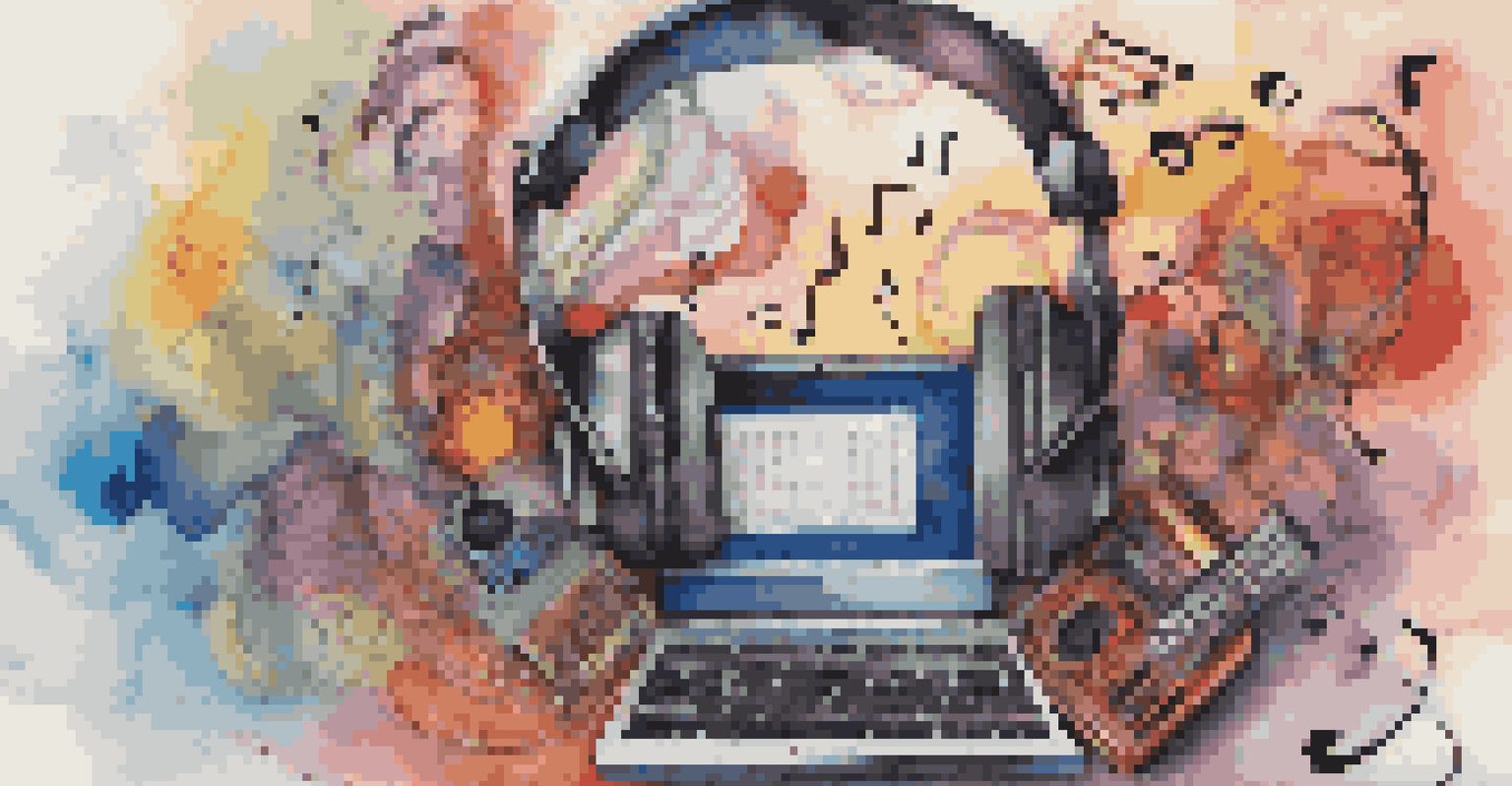The Role of Music Blogs in Shaping Criticism Today

The Evolution of Music Criticism Through Blogs
Music criticism has come a long way from traditional print media. In the past, reviews were largely confined to magazines and newspapers, which limited the voices that could be heard. With the rise of music blogs, a diverse array of opinions has emerged, democratizing the conversation around music.
Music is a world within itself; it's a language we all understand.
These blogs allow anyone with a passion for music to share their thoughts, leading to a more varied and accessible discussion. This shift not only empowers fans but also challenges established critics to consider new perspectives and genres. As a result, we see a richer tapestry of musical critique that reflects a wider range of tastes.
Moreover, music blogs often embrace niche genres that mainstream outlets might overlook. This inclusivity fosters an environment where underrepresented artists can gain visibility and engage with audiences who genuinely appreciate their work.
The Role of Personal Experience in Music Blogging
One of the unique aspects of music blogs is their focus on personal storytelling. Bloggers often share their own experiences and connections to the music they discuss, creating a more intimate relationship with their readers. This personal touch can resonate deeply, making readers feel like they are part of a community rather than just passive consumers.

Personal anecdotes can also provide context for the music being critiqued, enriching the reader's understanding. For instance, a blogger might share how a particular song played during a significant life event, which can enhance the emotional weight of the review. This narrative approach fosters a sense of authenticity that is sometimes missing in traditional critiques.
Furthermore, these stories often encourage readers to seek out the music themselves. When someone shares their journey with a song, it can inspire others to explore it, leading to a shared experience that transcends mere listening.
Accessibility and the Rise of Music Blogging
The accessibility of the internet has made it easier than ever for music enthusiasts to start their own blogs. This has led to an explosion of voices and perspectives, allowing for a richer dialogue about music. Unlike traditional media, where gatekeeping can limit who gets to share their opinion, the blogosphere is open to anyone with an internet connection.
The more you know about music, the more you can appreciate it.
This democratization of music criticism means that readers can find reviews that align more closely with their own tastes and experiences. For instance, a fan of underground hip-hop might turn to a specific blog dedicated to that genre rather than relying on mainstream outlets. This targeted approach helps create a more personalized experience for music discovery.
Moreover, the immediacy of blogs allows for timely responses to new releases, which keeps the conversation fresh and relevant. Bloggers can quickly share their thoughts on an album or single, often within days of its release, ensuring that the dialogue around music remains vibrant and engaging.
The Impact of Social Media on Music Blogging
Social media has played a pivotal role in the evolution of music blogs. Platforms like Twitter, Instagram, and TikTok allow bloggers to connect with their audience in real time, fostering a more interactive experience. This engagement can lead to discussions that extend beyond the written word, creating a community of music lovers who share their thoughts and recommendations instantly.
Additionally, social media offers bloggers a platform to share their work and gain visibility. A well-timed tweet or Instagram post can reach thousands of potential readers, allowing new voices to emerge and be heard. This viral potential can significantly impact an artist's career, as bloggers often have the power to influence trends and shape public opinion.
Furthermore, social media allows for real-time feedback and interaction between bloggers and their audiences. Readers can comment on posts, share their own experiences, and even suggest topics for future articles, creating a collaborative space that enriches the overall music discourse.
Challenges Faced by Music Bloggers Today
Despite the many benefits of music blogging, there are notable challenges that bloggers encounter. The sheer volume of content available online can make it difficult for individual voices to stand out in a crowded marketplace. With countless blogs and social media accounts vying for attention, it can feel overwhelming to carve out a niche.
Moreover, the pressure to stay relevant in a fast-paced digital landscape can be daunting. Bloggers often feel compelled to produce content quickly, which can sometimes lead to burnout or a decline in quality. Balancing passion with the demands of a content-heavy environment is a fine line to walk.
Additionally, monetization remains a tricky issue for many bloggers. While some find success through ads or sponsorships, others struggle to make a living from their passion. This financial uncertainty can impact their ability to continue producing content, limiting the diversity of voices in the music criticism landscape.
Music Blogs as Catalysts for Cultural Conversations
Music blogs often serve as platforms for broader cultural conversations, addressing issues such as race, gender, and identity within the music industry. By critiquing music through these lenses, bloggers can highlight important societal topics that resonate with their audiences. This focus on social issues elevates music criticism beyond mere reviews, encouraging readers to think critically about the art they consume.
For example, a blog might explore the representation of women in hip-hop, prompting discussions about sexism in the industry. By shining a light on such topics, music blogs can influence public opinion and inspire change, making them important players in the cultural landscape.
Additionally, these conversations can lead to greater awareness and support for marginalized artists. By amplifying underrepresented voices, music blogs contribute to a more equitable music scene where diverse perspectives are valued and celebrated.
The Future of Music Criticism in the Blogging Era
As we look ahead, the role of music blogs in shaping criticism is likely to continue evolving. With the rapid pace of technological advancements and changing consumer habits, bloggers will need to adapt to remain relevant. This might involve integrating new mediums, such as video content or podcasts, to engage with their audience more dynamically.
Moreover, the integration of artificial intelligence and data analytics could transform how music is critiqued. By analyzing listener trends and preferences, bloggers can tailor their content to better meet the needs of their audience, creating a more targeted and engaging experience.

Ultimately, the essence of music blogging will likely remain rooted in the passion for music and the desire to share that love with others. As long as there are dedicated individuals willing to explore, critique, and celebrate music, the influence of music blogs on criticism will continue to thrive.